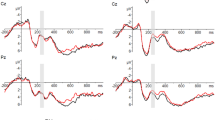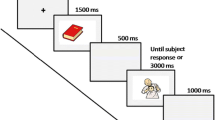Summary
A semantic categorization task was carried out on single words in order to determine under what circumstances a phonological code might be implicated in the process of getting from print to meaning. The subjects were asked whether or not a target word presented visually was a member of a superordinate category or “sounded like” a member of a category (e.g., “PAIR”; FRUIT). The target words were drawn from two groups, orthographically regular words (complying with grapheme-phoneme correspondences in English) and orthographically irregular words (exceptions to grapheme-phoneme correspondences).
The results indicated that a phonological code may only be a necessary requirement for word comprehension in a task demanding phonological assessment (i.e., in the case of PAIR in the “sounds like” task). Furthermore, it was argued that some phonological effects, arising in single word comprehension, may be attributed to prelexical phonology while others may implicate postlexical phonology.
Similar content being viewed by others
References
Baddeley, A.D. (1966). Short-term memory for word sequences as a function of acoustic, semantic and formal similarity. Quarterly Journal of Experimental Psychology, 18, 362–365.
Baron, J. (1973). Phonemic stage not necessary for reading. Quarterly Journal of Experimental Psychology, 25, 241–246.
Coltheart, M. (1979). Lexical access in simple tasks. In: G.U. Underwood (Ed.), Strategies of Information Processing. London: Academic Press.
Glushko, R.J. (1979). The organization and activation of orthographic knowledge in reading aloud. Journal of Experimental Psychology: Human Perception and Performance, 5, 674–691.
Kleiman, G.M. (1975). Speech recoding in reading. Journal of Verbal Learning and Verbal Behavior, 14, 323–339.
Marcel, A. (1980). Surface dyslexia and beginning reading: a revised hypothesis of the pronunciation of print and its impairments. In Coltheart M., Patterson K., & Marshall J.C. (Eds.), Deep Dyslexia. London: Routledge and Kegan Paul.
Meyer, D.E., & Gutschera, K. (1975). Orthographic versus phonemic processing of printed words. Presented at Psychonomic Society Meeting, Denver.
Meyer, D.E., & Ruddy, M.G. (1973). Lexical-memory retrieval based on graphemic and phonemic representations of printed words. Presented at Psychonomic Society Meeting, St. Louis.
Venezky, R.L. (1970). The Structure of English Orthography. The Hague, Paris: Mouton.
Wijk, A. (1966) Rules of Pronunciation for the English Language. London: Oxford University Press.
Parkin, A. (1982). Phonological re-coding in lexical decision; Effects of spelling-to-sound regularity depend on how regularity is defined. Memory and Cognition, 10, 43–53.
Seidenberg, M.S., Waters, G.S., Barnes, M.A., & Tanenhaus, M.K. (1984) When does irregular spelling or pronunciation influence word recognition? Journal of Verbal Learning and Verbal Behavior, 23, 383–405.
Author information
Authors and Affiliations
Rights and permissions
About this article
Cite this article
Pring, L. Phonological encoding and word comprehension. Psychol. Res 47, 211–216 (1985). https://doi.org/10.1007/BF00309448
Received:
Issue Date:
DOI: https://doi.org/10.1007/BF00309448




